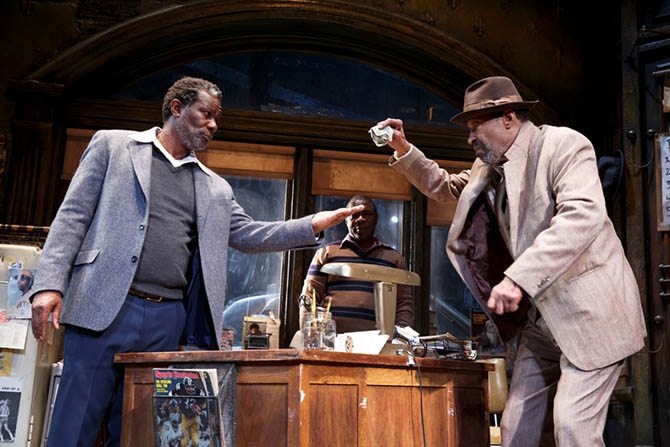Jitney
Reviewed by Elizabeth Ahlfors

John Douglas Thompson, Michael Potts, Anthony Chisholm (Photo by Joan Marcus)
August Wilson has a prime seat joining Eugene O'Neill, Arthur Miller and Tennessee Williams in the top lexicon of American playwrights. His language is musical and his heart is poetic, showing deep respect and understanding in the well-illuminated characters of "The Pittsburgh Cycle," ten plays exploring different decades of African-American culture in the 20th century. One of those earliest plays,
Jitney, is now making its premiere Broadway appearance at the Samuel J. Friedman Theatre.
Except for
Ma Rainey’s Black Bottom, set in Chicago,
Jitney and the other Cycle plays, takes place in the Hill District of Pittsburgh.
Jitney's decade is the 1970's, a time of urban renewal and its effect on the African-American community. Wilson wrote the play quickly and years later revised extensively before a 2000 off-Broadway production.
Actor-writer-director Reuben Santiago-Hudson keeps a focused eye on the sharply characterized men entering, exiting, and hanging out in a rundown gypsy-cab company in a neighborhood where licensed taxis will not go. Having performed in previous Wilson plays, Santiago-Hudson is familiar exploring the black experience with its stories, relationships and personal histories. From a superb ensemble with the characters, he draws out their tales about life, hope, women and gossip, portrayed with warmth. Individual struggles and the play's deep sentimentality, are peppered with vibrant bursts of laughter.
The gypsy cab company is run by Becker, played by a commanding John Douglas Thompson (
Satchmo at the Waldorf). Becker is a dedicated worker with a strong hand on his eclectic troupe of drivers. There is a private darkness, however, caused by the impending urbanization threatening his business and by the expected return of his son, Booster (Brandon J. Dirden), just released after 20 years in prison for murder. Becker's tough work ethic stands rock solid between father and son, as much as they longed to connect. Their estrangement shows hints of a later August Wilson play,
Fences, currently acclaimed in its film version.
Just as Becker is struggling with his problems, each of the drivers reveals personal mini-dramas. The youngest member of the squad, Youngblood, is a Vietnam vet. Andre Holland (
Moonlight) evokes Youngblood's charm that covers his immaturity and his inability with career goals and responsibilities for his girlfriend and mother of his baby, Rena (appealingly played by Carra Patterson). When Rena confronts him with her suspicions about disappearing money and mysterious disappearances, he admits he has been maneuvering behind Rena's back, but for a good reason. Her response surprises him, another strong scene, again relating to
Fences with the simmering resentments submerged below male and female roles in a relationship.
Most cast members have their own riveting story lines. Michael Potts (HBO
True Detective) plays the meddling Turnbo, a busybody who cannot have a conversation without revealing some gossipy tidbit he just heard. His nonstop chattering annoys the more reserved Doub (Keith Randolph Smith), a stolid Korean War veteran who gradually unveils the horrors he experienced in Korea. Fielding, a poignant character played by Anthony Chisholm, is an aging drunk, living on what he can scrape together and the memories of his successful tailoring career with customers like Billy Eckstein. Philmore (Ray Anthony Thomas) adds to the ensemble
The first driver we first meet is Shealy (Harvy Blanks), a splashy numbers runner dressed to the nines by Toni-Leslie James in wide-lapels and flamboyant colors. Blanks has performed in all ten plays in the "The Pittsburgh Cycle" and quickly sets the tone for Wilson's style and language. The set by David Gallo is low-down, but well-detailed, even including the cars parked outside. The sofa is well-worn with duct tape over the rips, like a metaphor for the patched up crumbling neighborhood. Lighting by Jane Cox and Darron L. West's sound design add to the city lights and sounds.
A line in
Ma Rainey’s Black Bottom describes the blues as "life's way of talking." August Wilson loved the blues and in
Jitney, original music by Bill Sims, Jr. weaves the sound of the blues through this rich, humorous and universal play, a knock-out addition to Broadway.
Jitney
Samuel J. Theatre
261 West 47th Street, NY
Previewed: Dec. 28, 2016. Opening: Jan. 19, 2017.
Manhattan Theater Club
Written by: August Wilson
Directed by: Ruben Santiago-Hudson
Running time: 2 hours, 30 minutes. One intermission
Review by Elizabeth Ahlfors
January 22, 2017
This review can also be seen on TotalTheater.com